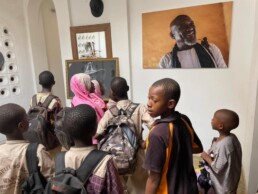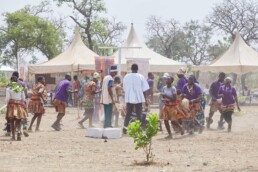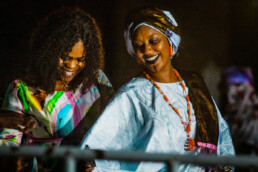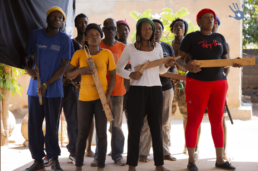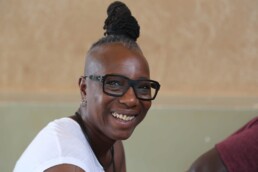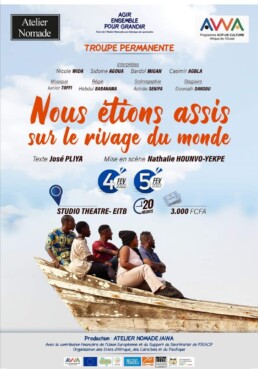TOP 10
Established as a cultural association in 2012, La Galerie Médina's mission is to contribute to the creation of an emerging market for contemporary Malian and African art and to ensure the promotion and sale of quality works in Mali, Africa and the world.
Their "TOP 10" project consists of a vast artistic introspection intended to lead to an exhibition that is both a retrospective of the last 10 years and a prospective of the next 10 years. A selection of 10 shortlisted artists, both established and emerging, of all generations, will present their projects to a jury of professionals. The exhibition of these works in the Medina Gallery, the production of a film and the publication of a catalogue will contribute to the promotion and distribution of cultural assets.
Remembering our Legends: They left gifts behind: Can we bridge the gap?
The Academy was created in 1995 to preserve, enrich and develop the national cultural heritage of Sierra Leone in the field of music and performing arts. It provides an advanced level of instruction in both music practice and theory, as well as in conducting and directing performances.
Remembering the Legends' initiative is to nurture and encourage the artistic talents of today with a view to their future professionalisation. By introducing the public, especially the younger generation, to the little-known works of former musicians, playwrights, composers, poets and other artists, the project aims to awaken the interest of citizens in the performing arts, and to bring about a reconsideration of the cultural and creative sector as a viable route to a full or part-time career.
"The Arts Bridge", Support for the professionalisation of the craft sector
The Arts Bridge project aims to preserve, professionalise and promote the work of weavers in the North-West of Ghana, a region where the local economy depends heavily on this craft. By seeking to collect and transmit this know-how, pool tools and design new patterns, The Arts Bridge hopes to professionalise the art of weaving and thereby protect the livelihoods of communities. A dedicated digital platform will present a database of contemporary craftsmen and artists, offer teaching modules and an online shop. These digital drivers will contribute to raising this Ghanaian craft tradition to the level of a world-renowned art.
Overview of expected productions
- registration of 3 weaving collectives with the World Crafts Council each year
- organisation of an annual weaving festival
- training of 5 master weavers (with more than 5 apprentices and more than 5 years experience). They will in turn train 50 weavers per year for two years
- hosting 5 contemporary artists in residence
Focus on Nubuke Foundation
Based in Accra since 2006, this NGO's mission is to promote, record and preserve the visual arts and culture of Ghana. Over the past 15 years, the Nubuke Foundation has propelled the careers of 150 contemporary artists. Based in Wa (North West Ghana) since 2010, it works to develop and enhance the tradition of tape weaving.
"SARGAL", promotion of musical heritage
Produced in partnership with the Institut français in Dakar, the "SARGAL" project ("pay tribute" in Wolof) is an artistic television programme that aims to raise awareness of the great names in music by reinterpreting classics from the Senegalese and pan-African musical heritage. By allowing the public to benefit from experience of the creative process and by giving a chance to new talents, "SARGAL" wants to share the taste of live music but also to reveal and train up-and-coming artists in the art of composition, arrangement and musical production. More broadly, this project aims above all to give visibility to the audiovisual sector and its various professions, and to encourage digital inclusion by developing diversified content accessible to all.
A look at planned productions
- creation of 180 jobs
- recruitment of 45 women in production
- 60 people trained after 3 years (20 people per season)
- 45 programmes produced
- 50 international collaborations
Focus on Studio Sankara
Studio Sankara was founded in Dakar in 2003 by rapper Didier Awadi, who was looking for autonomy to carry out his artistic projects. Today, Studio Sankara is a phonographic and audiovisual production agency recognised on the national and international market for its skills, expertise, technical resources and capacity to innovate.
"Sahelles connect", promotion of Cultural and Creative Industries
The “Sahelles connect” project consists of a programme to structure the cultural and creative industries in Mauritania, targeting youth, education and women, and in cooperation with the other countries of the G5 Sahel, West Africa and North Africa. Through this new scheme, the association is committed to opening a vocational training course in the arts and culture (“Mauritalent”), and to setting up an incubator for 15 cultural businesses run by Mauritanian women. In this perspective of economic and social development, education on rights, freedom and the place of women in the Islamic Republic remain major challenges for strengthening democracy.
Overview of expected productions
– Development of artistic products by young Mauritanian artists in cooperation with female artists from the G5 Sahel region, – Development of a “Green Festival” label
– Development of a new format for the Journal Rappé “Chitaari”
– Promotion of digital accessibility and development of new content
Focus on Assalamalekoum Cultures
Chaired by the Mauritanian artist Monza, Assalamalekoum Cultures is an association focused on cultural innovation in Mauritania. It has been working with the Assalam Alekoum festival since 2014, in consortium with ZAZA Productions, an independent music label. This multidisciplinary festival has been hosting artists from the world of music, cinema, dance and fashion for 14 years.
"Les Récréâtrales", pan-African platform for contemporary theatre
Initiated in 2002, the contemporary theatre festival Les Récréâtrales struggled to find its audience. In 2006, it decided to go out and meet them and set up in the Gounghin district of Ouagadougou. Les Récréâtrales set up its stages in family courtyards, instantly involving the local communities. It was an instant success. Thanks to the ACP-EU Culture (West Africa) - AWA programme, Les Récréâtrales intends to develop a digital platform for its creative and educational content and thus support the spread of pan-African contemporary theatre internationally, always with a view to including non-French-speaking theatre (initially Lusophone, Arabic-speaking and English-speaking) and a project for South-South and South-North artistic cooperation.
A look at planned productions
- broadcasting of at least 19 shows, including 10 creations produced or co-produced by the Récréâtrales and 3 non-French language shows
- translation and subtitling of the works presented
- representation of all regions of the African continent during the next two editions of the festival
- setting up a pan-African and international network for the distribution of works
Focus on les Récréâtales
Today the Récréâtrales – Résidences panafricaines d'écriture, de création et de recherche théâtrale (Panafrican theatre writing, creation and research residencies) – form one of the major events in contemporary theatre in French-speaking Africa. Its festival takes place every two years, from February to November, in Ouagadougou (Burkina Faso). It fosters open dialogue within the community and enables citizen engagement and empowermen
"Présence Noire dans la Danse", promotion of dance arts
More than ever, École des Sables wants to maintain its educational role and offer development opportunities to young dancers from the continent. This centre of excellence offers participants local and international artistic career opportunities. However, in order to allow black dancers to reveal themselves and to blossom outside the stereotypes of the dance world, it is essential that this course be given by teachers and researchers from Africa, its diaspora and the West Indies, in a spirit of sharing, dialogue and reciprocal exchange. Moreover, the collaborations between Pan-African dancers will be the fruit of new creations offered to festivals and a touring circuit in Europe, the United States and the world.
A look at planned productions
- Access to certified training for 30 dancers from Africa and the diaspora
- creating and nurturing different work opportunities through original choreographic writing rooted in black identity
- establishing communication tools
Focus on JANT-BI- École des Sables
Founded by Germaine Acogny and Helmut Vogt in 1998, Jant-Bi - École des Sables, the International Centre for Traditional and Contemporary African Dance, aims to provide professional training for African dancers and to develop and promote contemporary African dance. It has already trained over 700 dancers from 27 African countries.
"PAPRICAI+", support for capacity building of the creative business incubator
Based on the unique concept of a tri-polar structural device (e-training, e-support and e-financing platforms), the PAPRICAI+ project aims to strengthen the pedagogical and operational capacities of the PAPRICAI incubator. Through a revitalisation of the entrepreneurial ecosystem and an improvement of the institutional framework of the creative and digital sector in Togo, this project will contribute to the improvement of creativity, professionalisation and competitiveness of artists and creators operating in the digital environment. This ambitious project will ultimately benefit project leaders, entrepreneurial support structures and innovative companies and startups in the cultural and creative sector.
A look at planned productions
- strengthening the structural capacities and competitiveness of the incubator
- boosting the competitiveness of 100 digital start-ups
- creating a community of 20 creative entrepreneurship support structures
- helping to finance 100 innovative creative start-ups
Focus on ADEC
The Agence de Développement des Entreprises Culturelles has a vision of culture as a driver for socio-economic development in developing countries. Equipped with state-of-the-art human and technological resources, it excels in cultural engineering, the promotion and development of creative innovation and entrepreneurship.
"Agir ensemble pour grandir"
The Atelier Nomade houses the École Internationale de Théâtre du Bénin as well as several performance spaces, regular venues for Beninese, Togolese, Burkinabe and Nigerian artists. In addition to the establishment of a permanent, multi-purpose troupe of some twenty talents (directors, actors, dancers, puppeteers, circus artists, etc.), the consolidation and expansion project "Agir ensemble pour grandir " includes the creation of a museum of the performing arts. By working on the synergy between 9 sub-regional theatres (6 in Benin, 1 in Togo, 1 in Niger and 1 in Burkina Faso) and the networking of their cultural content, the project intends to take advantage of the income and move towards financial autonomy, a key objective for true anchoring and sustainability.
A look at planned productions
- creation of a permanent troupe
- opening 12 small format residences and 2 large format residences
- development of a network of cultural operators from 4 neighbouring countries
- creation of a digital platform and an online ticketing service with payment of tickets by telephone
- regular animation of the three stages of the Atelier Nomade
- creation and monetisation of a performing arts museum
Focus on Atelier Nomade
Atelier Nomade opened its doors in 1992. It is now home to the École Internationale de Théâtre du Bénin, a higher education institution that prepares students for a state diploma. The two pillars of its mission are professional training and artistic creation, which enable the cultural and artistic education of young people and local communities. The theatre school often works on themes that contribute to human development and good citizenship.
"Maremusica", production and distribution of music from Cape Verde
Highly impacted by the Covid-19 pandemic, the Cape Verdean cultural industry, and even more so its independent music industry, is in danger of disappearing. To save this popular heritage, Maremusica proposes to revive traditional music in Cape Verde by relocating the entire production chain to the archipelago. From identifying new talent to the creation of labels, including the opening of recording studios and the organisation of tours, this project involves the creation of around a hundred jobs (musicians, technicians, communication, digital, etc.) and guarantees the safeguarding and revival of the popular treasure that is Cape Verdean music.
A look at planned productions
- Production of 3 albums: an established artist in the Cape Verdean musical tradition; and two young talents, male and female
- Production of a major work of traditional Cape Verdean music (Mornas) with the Symphony Orchestra of the Calouste Gulbenkian Foundation, from Portugal
- Creation of digital platforms and uploading and monetising online content
- Creating jobs in the sector and ensuring income for artists and their families
- Attracting new investors
Focus on Maremusica, Produção, edição e distribuição musical
Founded in 2016 by musician and writer Mario Lucio, former Cape Verdean Minister of Culture, Maremusica's main objective is the creative and financial independence of Cape Verdean artists, the protection of traditional music and the discovery of new talent.




